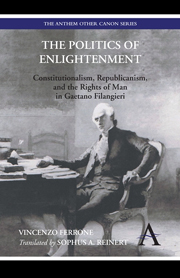 The Politics of Enlightenment
The Politics of Enlightenment from Part Two - A Difficult Legacy
Published online by Cambridge University Press: 05 February 2013
Durable constitutions are those which the people themselves form… One must take men as they are and as they forever will be, full of vices, full of errors… I do not believe that the constitution consists in a declaration of the rights of man and of the citizen… The more I reflect on these subjects, the more reasons I find for believing that founding the Neapolitan Republic is nothing but returning things to the old state.
Cuoco, Frammenti di lettere dirette a Vincenzo Russo (1801)Cuoco has always occupied an important place in the history of Italian political thought over the past two centuries. Indeed, bitter battles have been fought around his Saggio storico sulla Rivoluzione di Napoli, contributing considerably to the formation of a historical consciousness for generations of Italians. Every now and then, that extraordinary text is read, appreciated or evaluated negatively, in its entirety or in its specific parts, by moderates and by radicals, by Catholics and by laymen, by democrats and liberals, by fascists and communists. Manzoni, Foscolo, Gioberti, Mazzini, Pisacane, and even Croce and Gentile engaged with, and were often willingly charmed by, Cuoco's critique of the 1799 republicans, which he presented as heroes which were generous but devoid of a real and realistic revolutionary culture. Through the Saggio storico, the Republic of 1799, with its terrible conclusion in the bloodbath brought about by the Bourbons and the sanfedisti, has in fact become a crucial and structuring event in the history of modern Italy.
To save this book to your Kindle, first ensure [email protected] is added to your Approved Personal Document E-mail List under your Personal Document Settings on the Manage Your Content and Devices page of your Amazon account. Then enter the ‘name’ part of your Kindle email address below. Find out more about saving to your Kindle.
Note you can select to save to either the @free.kindle.com or @kindle.com variations. ‘@free.kindle.com’ emails are free but can only be saved to your device when it is connected to wi-fi. ‘@kindle.com’ emails can be delivered even when you are not connected to wi-fi, but note that service fees apply.
Find out more about the Kindle Personal Document Service.
To save content items to your account, please confirm that you agree to abide by our usage policies. If this is the first time you use this feature, you will be asked to authorise Cambridge Core to connect with your account. Find out more about saving content to Dropbox.
To save content items to your account, please confirm that you agree to abide by our usage policies. If this is the first time you use this feature, you will be asked to authorise Cambridge Core to connect with your account. Find out more about saving content to Google Drive.